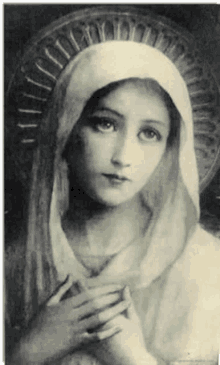Mary: The Antithesis and Answer to Modern-Day Feminism
The Power of Humility in a Culture Obsessed with Control
In a world that tells women to shout, prove, fight, and climb, the Virgin Mary whispered a quiet but mighty “yes” in the same world we call our home today.
She is the antithesis of the modern feminist ideal, not because she is weak or silenced, but because she is something far more powerful: fully surrendered.
Mary has no pride.
Where the world teaches us to self-promote, she chooses to self-empty. Where the world tells us to strive for comfort, her heart was pierced seven times (Luke 2:35). Where the world tells us to “live it up” she died to self.
She is not concerned with recognition or accolades. Her greatness lies in her smallness, her glory in her hiddenness.
She is full of grace.
Not full of herself. Not full of ambition or entitlement, but filled with the very life of God. She receives, and in the quiet contemplation of her heart, she overflows. Grace perfects and protects her; it does not compete with her femininity, it elevates it.
She is humble.
Not in a passive or weak way, but in the most radical way possible: she places herself entirely in the hands of God. Her humility is active trust. She does not grasp or demand, she simply believes, and it is done unto her.
She hid herself to magnify Christ.
While today’s culture teaches us to insert ourselves at the front of culture, Mary steps aside to exalt Someone greater. Her whole life becomes a lens through which we see Jesus more clearly.
In the words of St Louis Marie de Montfort:
Because Mary remained hidden during her life she is called by the Holy Spirit and the Church "Alma Mater", Mother hidden and unknown. So great was her humility that she desired nothing more upon earth than to remain unknown to herself and to others, and to be known only to God. In answer to her prayers to remain hidden, poor and lowly, God was pleased to conceal her from nearly every other human creature in her conception, her birth, her life, her mysteries, her resurrection and assumption. Her own parents did not really know her; and the angels would often ask one another, "Who can she possibly be?", for God had hidden her from them, or if he did reveal anything to them, it was nothing compared with what he withheld.
She said yes to God.
In a culture built on self-reliance, Mary’s greatness came not from asserting her own will, but from aligning it with God’s. Her fiat: “Let it be done to me according to your word” is the most courageous form of freedom!
Mary is not the woman the world tells us to be.
But she is the woman our souls long to become.
She doesn’t fight for power, she bears Life.
She doesn’t dominate, she disciples.
She doesn’t shout, she prays.
And in all her hiddenness, she has been exalted.
Because the lowly are always lifted by the hand of God.
Why is she the Antithesis and What Can we learn from Her?
In a culture that promotes the opposite of what Mary embodied, her quiet strength offers us a better way.
We can learn to hide ourselves to magnify Christ.
This doesn’t mean erasing who we are, it means anchoring our identity in something greater than ourselves. Mary shows us that holiness is about fidelity. It’s about a life so deeply rooted in God that every word, every decision, every yes becomes a reflection of Him.
Mary’s life reveals that surrender is not passive, its powerful.
Because she chose the hidden path, God made her the most visible woman in salvation history. She chose obedience, and God made her the dwelling place of the Word made flesh. She chose trust, and became the Mother of Mercy: our live, our sweetness, and our hope.
She models for us a different kind of womanhood; one that doesn’t need to compete, climb, or conquer to matter.
Instead, she invites us to become women of quiet strength. Women who listen more than we speak, who serve more than we strive, who make space in our hearts for God to grow something eternal.
Mary doesn’t just challenge the feminist narrative, she fulfills the deepest desires of the feminine heart: to be known by God, to be loved by God, and to bear life that endures.
Let us become women who, like Mary, say yes to God even when it costs us comfort, attention, or control.
Let us become small, so He can be great.








Beautiful!
“Here am I, the servant of the Lord; let it be with me according to your word.”
Few words have ever been spoken that capture the amount of humility, dignity, trust, and beauty of Mary’s right there.
Thank you for this article.